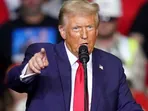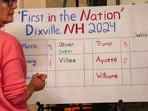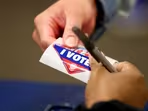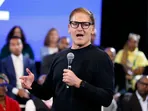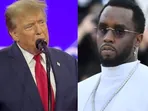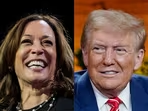‘Live out loud,’ US Black queer activists seek recognition and representation in the fight for equality
Some Black queer activists who spoke at the 60th anniversary of the 1963 march on Washington this summer felt that their voices were not heard enough, as they addressed a sparse crowd before the main event. They also felt that their struggle for LGBTQ+ rights was overshadowed by the historical neglect and exclusion of Black queer leaders in the civil rights movement.
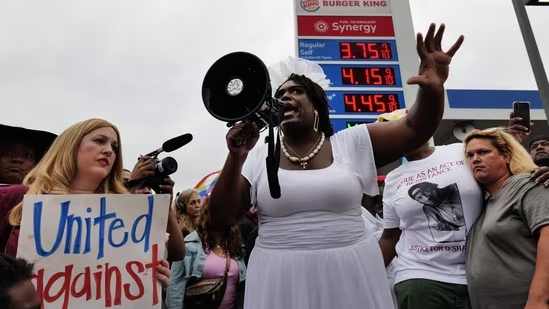
They were encouraged, however, by the fact that some prominent speakers highlighted the current political attacks on LGBTQ+ rights, such as the attempts to ban gender-affirming care for minors. And despite the challenges of visibility and representation of Black queer activists in social movements, some advances are being made in the political arena. This month, Senator Laphonza Butler became the first Black and openly lesbian senator in Congress, as she replaced the late Dianne Feinstein.
We're now on WhatsApp. Click to join.Several activists and lawmakers told the Associated Press that honoring the legacies of Black queer civil rights icons and increasing the representation of Black LGBTQ+ people in politics and advocacy are essential to correct the erasure of their contributions.
ALSO READ| ‘We’ve got to be on the lookout,’ FBI Chief warns of growing lone wolf terror threats on US soil amid Hamas situation
“We have to also then distinguish what it means to be queer in a world that thinks that queerness is adjacent to whiteness – and that queerness saves you from racism. It does not,” said Hope Giselle, a speaker who is Black and trans, and communications director for the GSA Network, a non-profit that helps students form gay-straight alliance clubs in schools.
In an interview with the Associated Press, Butler said she hopes that her appointment signals progress in the broader cause of representation.
“It’s too early to tell. But what I know is that history will be recorded in our National Archives, the representation that I bring to the United States Senate,” she said last week.
“I am not shy or bashful about who I am and who my family is. So my hope is that I have lived out loud enough to overcome the tactics of today.”
“But we don’t know yet what the tactics of erasure are for tomorrow,” Butler said.
In a 2023 study conducted by the LGBTQ+ Victory Institute, it was found that Black LGBTQ+ political representation has surged by a remarkable 186% since 2019. Notably, this surge included the historic election of former New York representatives Mondaire Jones and Ritchie Torres, both of whom were the first openly gay individuals of Black and Afro-Latino heritage to serve as congressmen, following the 2020 election. Additionally, the report highlights the significant achievement of former Chicago mayor Lori Lightfoot in this context.
These leaders are treading a path similar to that of civil rights icons like Bayard Rustin, Pauli Murray, and Audre Lorde. It's noteworthy that historical accounts often emphasize their Black identities while downplaying or erasing their queer identities in their roles within the civil rights and feminist movements. This observation was made by David Johns, who serves as the executive director of the National Black Justice Coalition, a prominent LGBTQ+ civil rights organization.

Rustin, who served as an advisor to the Reverend Martin Luther King Jr. and played a pivotal role in organizing the historic 1963 March on Washington for Jobs and Freedom, serves as a prominent illustration of this phenomenon.The march he helped plan paved the way for the passage of federal civil rights and voting rights laws in the next few years. But his gay identity is often treated as a minor detail rather than a crucial part of his involvement, Johns said.
“We need to teach our public school students history, herstory, our beautifully diverse ways of being, without censorship,” he said.
There is a belief that the marginalization of Black LGBTQ+ leaders can be attributed to the influence of respectability politics, a tactic in certain marginalized communities that involves isolating or penalizing individuals who do not conform to the prevailing societal norms.
"White supremacist ideology intertwined with Christianity has not only perpetuated racism and systemic oppression but also played a role in erasing Black queer history. While the Black Christian church played a pivotal role in the civil rights movement, it has, at the same time, demonstrated a 'theological hostility' toward LGBTQ+ communities," stated Don Abram, the executive director of Pride in the Pews.
ALSO READ| Poll reveals most Americans want the US government to publicly support Israel
He further highlighted that this co-optation of religious practices by white supremacists is being used as a means to subjugate Black, queer, and transgender individuals. Abram noted, "They are largely using moralistic language, theological language, religious language to justify oppressing queer and trans folk."
It's worth noting that not all queer advocacy communities have been inclusive of Black LGBTQ+ voices. Andrea Jenkins, the president of the Minneapolis city council, emphasized her commitment to amplifying queer visibility within Black spaces as well as promoting Black representation within predominantly white, queer spaces.
"We need to ensure that more Black, queer, transgender, and nonconforming individuals have a presence in these political spaces to bridge these gaps," Jenkins explained. "Creating awareness on both sides of the issue is crucial in uniting people and ensuring full community participation."
Disclaimer: The copyright of this article belongs to the original author. Reposting this article is solely for the purpose of information dissemination and does not constitute any investment advice. If there is any infringement, please contact us immediately. We will make corrections or deletions as necessary. Thank you.
Title:‘Live out loud,’ US Black queer activists seek recognition and representation in the fight for equality
Url:https://www.investsfocus.com


